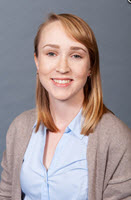
The microbial community living in fish’s gastrointestinal tracts, also called the gut microbiome, are vital to their developing immune systems and can influence behaviors such as foraging. Studies conducted following Deepwater Horizon observed that crude oil exposure can shift the gut microbiome’s community structure to favor microbes that can degrade toxic oil chemicals. Determining if oil exposure triggers similar responses in other Gulf of Mexico fish species and if their foraging behaviors change is important to understanding their risk to oil exposure.
Maggie Wigren is investigating how toxic polycyclic aromatic hydrocarbons (PAHs) in weathered oil affect the gut microbiomes and foraging behavior of sheepshead minnows, a small fish that lives in the estuarine environments surrounding the Gulf of Mexico. The presence of oil-degrading microbes in the minnows’ guts could serve as bioindicators of polluted areas and potentially decrease the bioaccumulated oil load in fish.
Maggie is a master’s student with Purdue University’s Department of Forestry and Natural Resources and a GoMRI Scholar with the project Integrating Teleost Transcriptomes to Identify Ecologically Meaningful Responses Following Oil Exposure.
Her Path
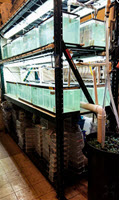
As a child, Maggie was fascinated by fish and marine environments and spent most of her childhood swimming, fishing, and wading through streams. She developed a passion for understanding and protecting natural ecosystems that inspired her to pursue an ecology and environmental science undergraduate degree at Purdue University. There, she became interested in disease ecology and ecotoxicology in aquatic habitats and accepted a graduate student position in Dr. Marisol Sepulveda’s ecotoxicology lab conducting GoMRI-funded research that investigates how different fish species respond to oil exposure.
“When I heard about the devastation that the Deepwater Horizon oil spill caused, I felt helpless,” said Maggie. “I’ve always been passionate about preserving and protecting natural areas, so when I found an opportunity to do research that could help inform oil spill response efforts, I was eager to start. I hope that the more we know about the broad, negative impacts of oil spills, the more our society can work towards more environmentally friendly policies and cleaner forms of energy.”
Her Work
Maggie conducted experiments to observe how oil affects microbial communities in the minnows’ guts and examine minnow foraging behaviors before and after oiling. She used a high-speed blender to thoroughly mix 1 gram of weathered Deepwater Horizon oil in 1 liter of artificial seawater, creating a high-energy water-accommodated fraction or HEWAF (a homogenous oil-water solution). She exposed 5 fish to a 5% concentration of the HEWAF solution for 7 days, changing the water daily to maintain the oil dose and repeated this process three times.
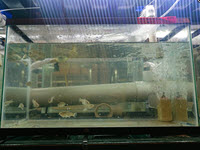
For the microbiome experiments, Maggie dissected and extracted DNA from the fish’s gastrointestinal tracts after the 7-day exposure. DNA analysis from 16S rRNA and shotgun metagenomic sequencing will tell her which bacteria are present and their functions. The data analysis is still ongoing, but early results show trends that suggest oil exposure alters the gut microbiome composition in sheepshead minnows and increases the abundance of oil-degrading bacteria.
For the foraging experiments, Maggie observed the number of prey items fish captured at the beginning and end of the 7-day exposure. She released 10 zooplankton (Daphnia magna) into the oil treatment and control tanks and mounted a GoPro action camera to record how many zooplankton the fish consumed within 3 minutes. Surprisingly, oil-exposed fish exhibited higher prey capture rates than control fish, the opposite of her initial hypothesis. She theorizes that the oil-exposed fish may be attempting to acquire more nutrients while in a stressed state and hopes that future studies will investigate this possibility further.
Maggie hopes that her research will help demonstrate the broad effects of oil exposure on non-game and sporting fish. “Although most people don’t think about minnows, they are an important foraging fish for other larger, more economically important fish species,” she said. “By observing oil’s effect on the minnows’ microbiome, we can create a broader toxicological profile for oil contamination in fish, which could help identify bacteria that are potential bioindicators of pollution.”
Her Learning
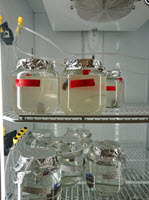
Maggie entered Dr. Sepulveda’s lab without any toxicology or microbial ecology experience and was initially overwhelmed with figuring out how to conduct microbiome research and dealing with equipment issues. Despite these obstacles, she found support in her peers, advisor, and advisory committee, finding that talking out her struggles cleared her mind, led her to solutions, and improved her communication and collaboration skills. “The whole process of designing, executing, and analyzing my own experiment has helped me grow significantly as a scientist and become more independent,” she said.
Maggie recalls that she felt intimidated the first time she attended a large scientific conference but learned from fellow attendees that everyone experiences imposter syndrome at some point in their career. “It was very eye-opening and refreshing to listen and talk to fellow scientists in the field,” she said. “I came back revitalized and ready to tackle the rest of my project with new ideas about how to analyze my results.” She is grateful that she can contribute meaningful research towards oil spill science and ecosystem preservation as a member of the GoMRI science community.
Maggie plans to move to Vancouver, British Columbia, after graduating and pursue a career in environmental consulting, marine conservation research, or outreach that fosters scientific literacy and environmental stewardship. She feels that it is important to learn from those in fields that interest you. “Take advantage of any and all resources that come your way and expand your network of fellow scientists,” she said. “Don’t be afraid to step outside of your comfort zone, and don’t hesitate to ask for help when you need it. There is no shame in reaching out for support among your peers and advisors.”
Praise for Maggie
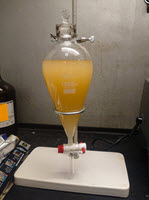
Maggie’s research is the first microbiome study conducted in Dr. Sepulveda’s lab, who explained that Maggie was instrumental in designing the experiment and developing and implementing the study’s different protocols, including the protocols for 16S rRNA sequencing and metagenomics. “I have watched Maggie grow as a scientist over the past 2+ years,” she said. “I think her work is unique and will advance our field. She has a bright future ahead of her!”
The GoMRI community embraces bright and dedicated students like Maggie Wigren and their important contributions. The GoMRI Scholars Program recognizes graduate students whose work focuses on GoMRI-funded projects and builds community for the next generation of ocean science professionals.
By Stephanie Ellis and Nilde Maggie Dannreuther. Contact sellis@ngi.msstate.edu for questions or comments.
************
The Gulf of Mexico Research Initiative (GoMRI) is a 10-year independent research program established to study the effect, and the potential associated impact, of hydrocarbon releases on the environment and public health, as well as to develop improved spill mitigation, oil detection, characterization and remediation technologies. An independent and academic 20-member Research Board makes the funding and research direction decisions to ensure the intellectual quality, effectiveness and academic independence of the GoMRI research. All research data, findings and publications will be made publicly available. The program was established through a $500 million financial commitment from BP. For more information, visit http://gulfresearchinitiative.org/.
© Copyright 2010-2020 Gulf of Mexico Research Initiative (GoMRI) – All Rights Reserved. Redistribution is encouraged with acknowledgement to the Gulf of Mexico Research Initiative (GoMRI). Please credit images and/or videos as done in each article. Questions? Contact web-content editor Nilde “Maggie” Dannreuther, Northern Gulf Institute, Mississippi State University (maggied@ngi.msstate.edu).
